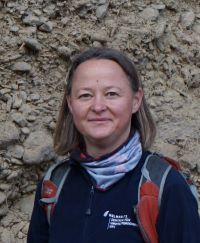Dr. Ulrike Werban (UFZ Leipzig): Near surface characterization using geophysical and optical methods supported by machine learning
Vortrag im Geowissenschaftlichen Kolloquium am 2. Februar, 12:15 online via Zoom

Sustainable management of water and nutrients in agricultural landscapes requires reliable data to support informed decisions. As geophysical characterization offers insights in processes driving the soil–plant–atmosphere continuum there is a great potential to better characterize and quantify the related processes noninvasively from the plot to landscape scale. For sustainable food production, knowledge of the horizontal as well as vertical variability of soil organic C (SOC) and soil moisture at field scale is crucial. I will illustrate how spatial geophysical data help to characterize a large field site in terms of SOC and soil moisture. In particular machine learning models using depth-related data from multiple electromagnetic induction sensors and a gamma-ray spectrometer can provide insights into the field scale variability.
Furthermore in situ spectral methods offer an immense potential for near surface characterization, e.g. the detection of horizons of soil organic matter. Therefore I will discuss a high resolution direct push-based study to characterize structures in the groundwater saturated zone. The dimensions and sedimentation history of a former channel were reconstructed by a combination of geoelectrical and optical in situ sensing.
Geowissenschaftliches Kolloquium "Perspectives of non-seismic applied near-surface geophysics"
Online via Zoom:
https://uni-bremen.zoom.us/j/96524048625?pwd=VXAyWEVqNHo2Mzd3N1IrSVVrSVNIZz09
Weitere Informationen:
Dr. Ulrike Werban
e-Mail: ulrike.werban@ufz.de
https://www.ufz.de/met

